Menu

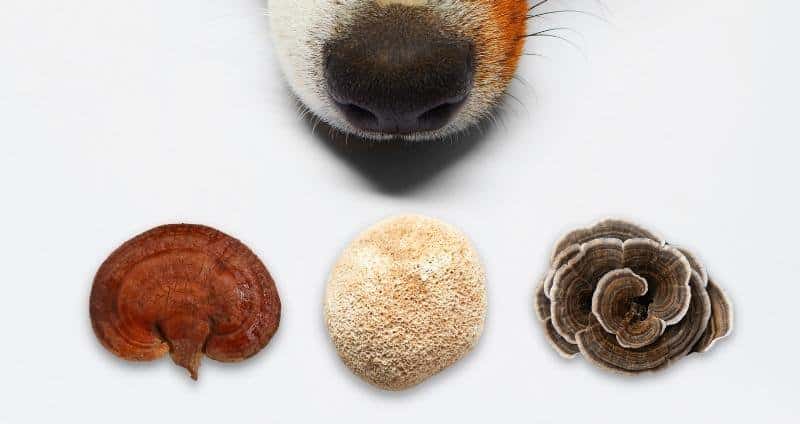
What would we do without our furry friends?
Those gentle snuggles after a stressful Monday and giant welcome-back hugs at the airport make life all the better.
Simply put, pets are family. This is why we’re always looking to keep them healthy, and mushroom extracts are a versatile way to do that.
Unfortunately, not all mushroom supplements work. Some contain diluting fillers that limit their bioactive compounds and functional benefits.
To help you pick the best mushrooms for dogs and cats, we’ve gathered information about three types of mushroom extracts: Turkey Tail, Reishi, and Lion’s Mane. As we go over their features, you’ll learn:
But first, let’s look at the different types of mushroom supplements and their uses.
There are various options for mushroom supplements with different bioactive compounds and benefits.
However, all medicinal mushrooms contain beta-glucans that can stimulate your pet’s immune system.
The following table highlights three mushroom supplements and the various needs they support:
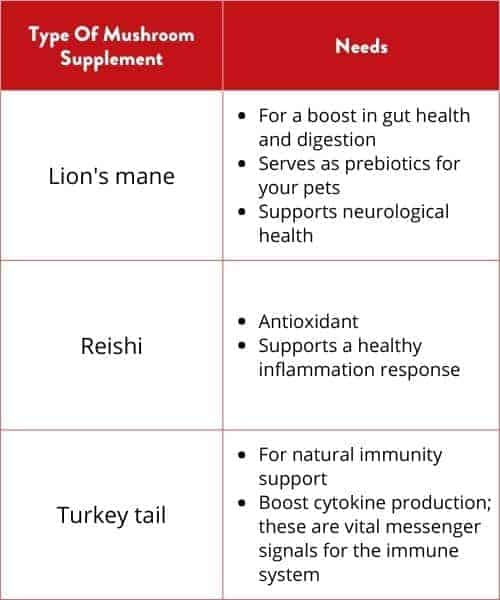
Let's delve into these mushroom supplements and their features.
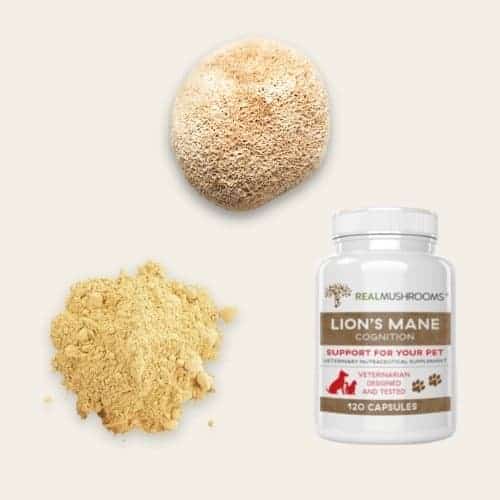
Lion’s Mane Extract from Real Mushrooms is produced using hot water to break down the fibrous cell walls and release this mushroom's bioactive molecules.
This method is called hot water extraction and results in concentrated levels of beta-glucans, which have important immune health benefits. Beta-glucans help train your pet's immune health to be vigilant and defend against possible challenges, among other benefits.
To get an idea of how pet owners have been using Lion’s Mane for their furry loved ones, read their reviews and latest prices:
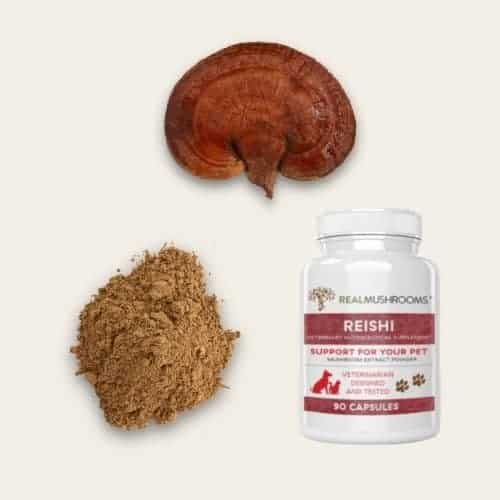
Reishi Capsules from Real Mushrooms are produced using hot water and alcohol. The hot water extracts the water-soluble compounds of Reishi mushrooms while the alcohol pulls out the water-insoluble components.
This procedure leads to a wholesome supplement with various bio-actives, from immune-boosting beta-glucans to triterpenes that promote a healthy inflammation response in your furry one.
For instance, Reishi Capsules have triterpenes (defensive compounds) such as ganoderic acids, which are non-water soluble and best extracted using alcohol.
The Reishi Capsules give you additional active ingredients, but if you want to learn more, read their reviews and latest prices.
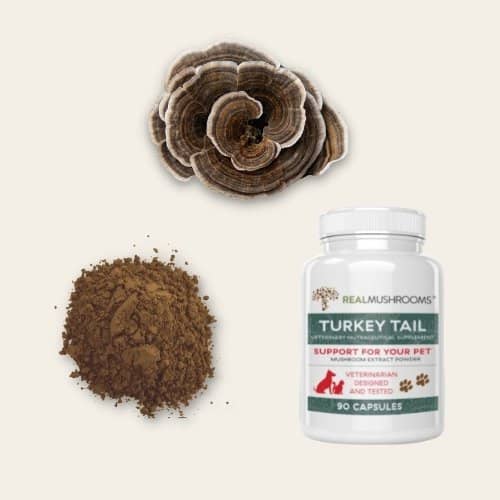
Similar to Lion’s Mane, Turkey Tail Extract by Real Mushrooms is also produced by hot water extraction.
This process keeps beta-glucan levels high (at over 30%). Turkey tail is the subject of more scientific studies than any other functional mushroom. Time and again it has shown its effectiveness in supporting the immune system, even among animals.
You’ll get more beta-glucans with Turkey Tail Extract, but if you want to learn more, check out the reviews and latest prices.
Mushroom supplements such as Lion’s Mane Extract can enhance your pet’s gut health. They contain oligosaccharides, which are natural carbohydrates that act as prebiotics (food for the good bacteria in your pet’s gut).
One study confirmed this fact when it concluded that feeding oligosaccharides to companion animals improved their microbial ecology and stool quality [1].
There are also human clinical studies showing Lion’s Mane can be highly beneficial in relation to gastrointestinal issues, and ulcers [2,3,4].
Mushroom supplements such as Turkey Tail Extract support your pet’s immune system by boosting the production of cytokine and T cells (one of the primary lymphocyte cells that form the immune response).
These supplements contain polysaccharide-Krestin (PSK), a compound that one study found to support T cell production.
Holistic vets like Dr. Rob Silver DVM, and Dr. Donna Kelleher DVM recommend Lion’s Mane extract for slowing the progress of neuro-degenerative ailments in dogs and cats such as Degenerative Myelopathy (a.k.a. Dog Lou Gehrig’s Disease) and Canine Cognitive Dysfunction (a.k.a. Dog dementia).
Using Lion’s Mane extract as a natural solution for pet neurological support is based on human and animal studies that have demonstrated the positive effects of this mushroom on protecting cognitive function, stimulating nerve growth, and even helping regenerate damaged nerves [5,6,7,8,9].
Giving your dog or cat a Lion’s Mane supplement is also a good preventative step for protecting their cognition and supporting healthy brain function as they age. Reishi is also useful as a stellar source of antioxidants for keeping neurons healthy as pets age.

The best mushroom supplements feature various bio-actives with different health benefits, but they also share some features and advantages—for instance, they use the mushroom itself, not mycelium or fillers, and they have high beta-d-glucans content.
Here’s a deeper look at these features and their advantages.
For these fungal organisms, the mushroom, sometimes referred to as the fruiting body, is just one stage in its life cycle. It’s what you see growing above the ground and what you are buying in the supermarket. However, many so-called mushroom supplements sold in North America do not have mushrooms in them at all!
Instead, these companies use the root system of the mushroom, which is called the mycelium. Why? Because it is far more economical to produce mycelium than to grow mushrooms in full.
Mycelium for supplements is typically grown in a grain-based substrate (the medium the mycelium grows on). When harvesting the mycelium, the grain is not separated from the mycelium and goes straight into the final product. This grain is just filler and provides no health benefits.
Between the grain-based filler and the lack of mushrooms, many supplements contain low concentrations of beneficial compounds from fungi, and high concentrations of starch.
We provide a detailed breakdown of the key differences between the mushroom (fruiting body) and the mycelium (vegetative body) in our article Functional Mushroom Benefits: Mycelium vs Fruiting Body.
Top mushroom supplements are processed without mycelium, chemical additives or preservatives. They use only the mushroom.
Here’s an example of a label from Real Mushrooms that clearly indicates the product is made of 100% mushrooms, not mycelium, and with no added fillers or starches of any kind (green arrow).
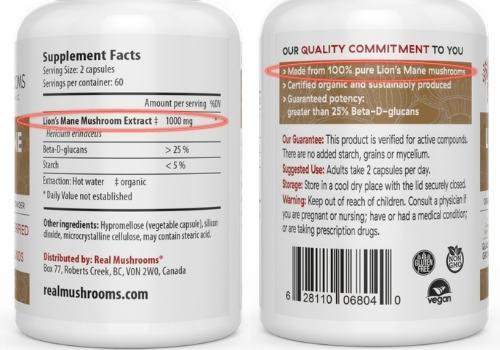
These are common polysaccharides (carbohydrate arrangements) found within the cell walls of mushrooms and in supplements.
Beta-d-glucans serve your pet by turning the immune system up or down (immunomodulation), among other health benefits, but this effect isn’t consistent across all mushroom species and supplements.
Immunomodulation depends on factors such as:
Expert Tip: Check the label on your mushroom supplement before purchasing to ensure you’re getting the highest quality. The best manufacturers document the levels of bio-actives present in their products.
The most common talking points on mushroom supplements for pets among users were regarding:
"My dog has been taking Turkey Tail for three weeks and I see a dramatic improvement in her energy level." Ellie, Turkey Tail Reviewer
"My dog is almost 17 and I am excited to find a supplement that has taken years off his age." Stacy, Lion’s Mane Reviewer
"My senior foster is very unsettled at certain times of the day. These chews help her relax and settle down." Beth H, Mushroom Relax Pet Chews Reviewer
Yes, you can. In essence, mushroom supplements are functional foods and work best when combined with a balanced diet.
This timeline is variable, but mushroom supplements like Reishi and Lion’s Mane can take effect after 2–3 weeks of daily use.
Most mushroom extracts can be taken once a day and still be effective. Check the labeling on your supplement to confirm the recommended dosage.
Some of the functional mushrooms are too tough to be edible (i.e., reishi and turkey tail). Also, mushroom supplements are made with an extraction process that makes the natural compounds within the mushroom more accessible to your pet’s body.
Otherwise, these valuable compounds would remain trapped behind chitin fungal walls—the same tough substance that makes up crustacean shells—and undigested.
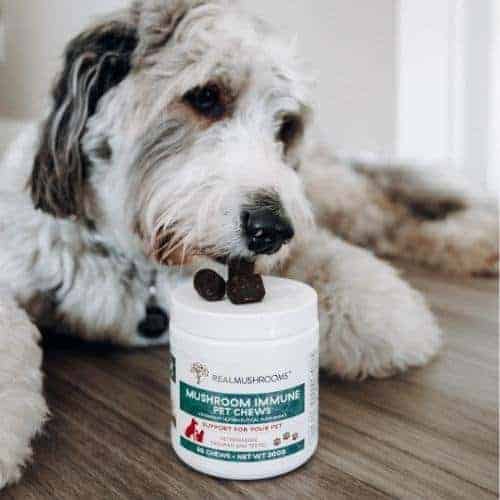
So there you have it—three needs uncovered by three types of mushroom supplements: Lion’s Mane, Reishi, and Turkey Tail.
Whichever option you choose, consider the following:
At Real Mushrooms, our goal is simple: to offer high-quality supplements from actual mushrooms. This stems from the industry problem of diluted supplements.
A recent study of mushroom supplements found that 74% of Reishi products are inauthentic. Most contain diluting fillers such as grain and mycelium.
Dilution causes higher concentrations of alpha glucans and lower levels of crucial beta-glucans. As such, these supplements offer little value to your pets.
Real Mushrooms supplements are made solely from mushrooms (the fruiting body). This reality is why we list the scientifically verified ingredients and active compounds on our products. unlike most companies.
We also offer cordyceps mushrooms, another functional mushroom that may help regulate oxygen flow and energy levels for humans and pets. Cordyceps mushrooms are gaining recognition for their potential to boost endurance and promote active movement in animals.

Disclaimer: The information or products mentioned in this article are provided as information resources only, and are not to be used or relied on to diagnose, treat, cure, or prevent any disease. This information does not create any patient-doctor relationship, and should not be used as a substitute for professional diagnosis and treatment. The information is intended for health care professionals only. The statements made in this article have not been evaluated by the Food and Drug Administration. Any products mentioned are not intended to diagnose, treat, cure, or prevent any disease. The information in this article is intended for educational purposes. The information is not intended to replace medical advice offered by licensed medical physicians. Please consult your doctor or health practitioner for any medical advice.
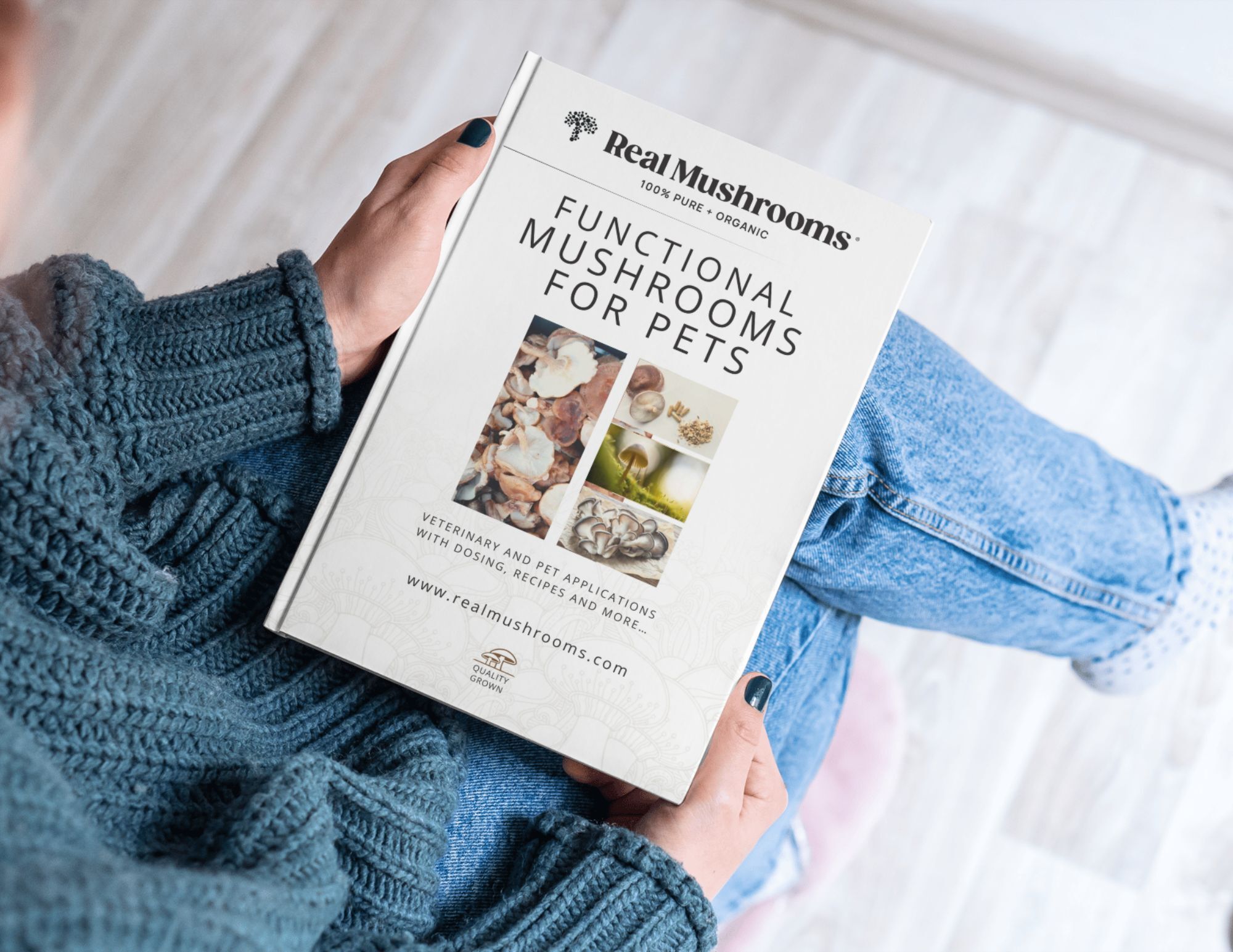
– Plus, Enjoy Exclusive Tips and Updates with Our Real Mushrooms for Pets Newsletter